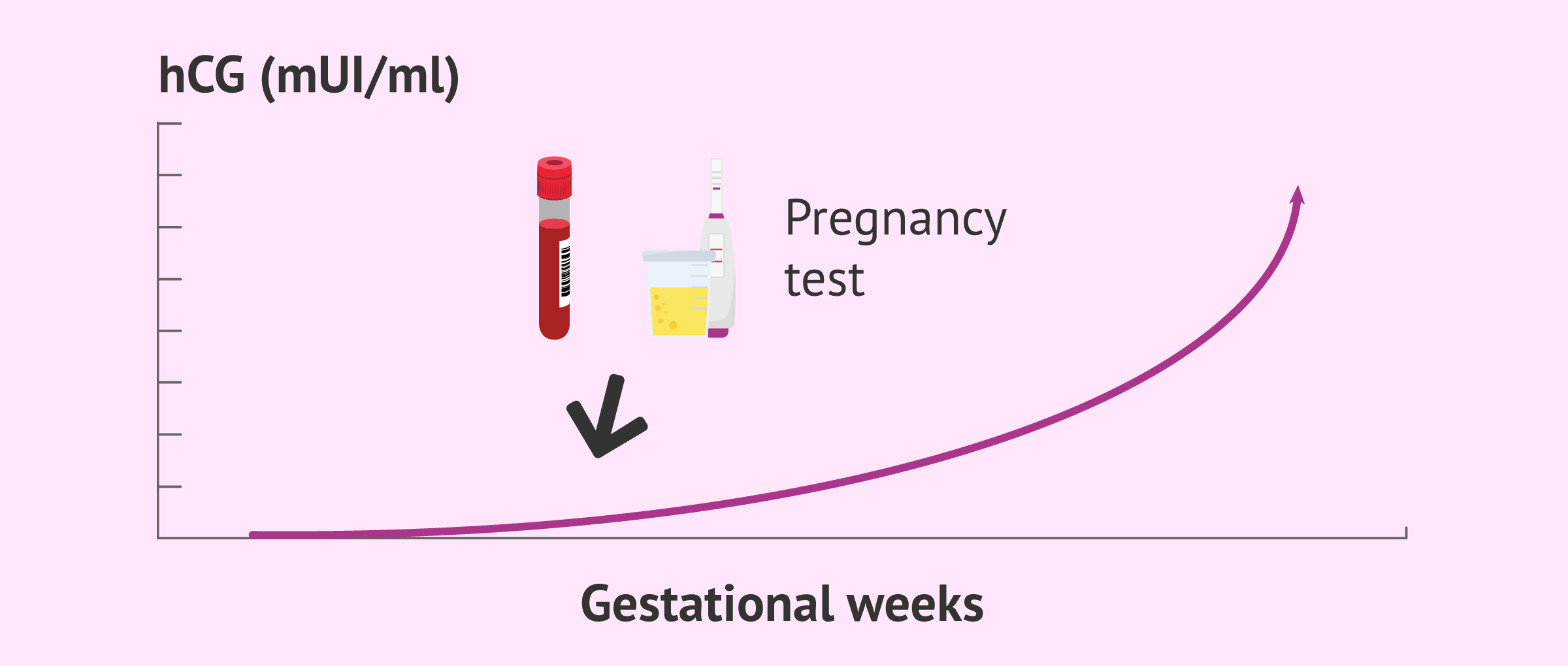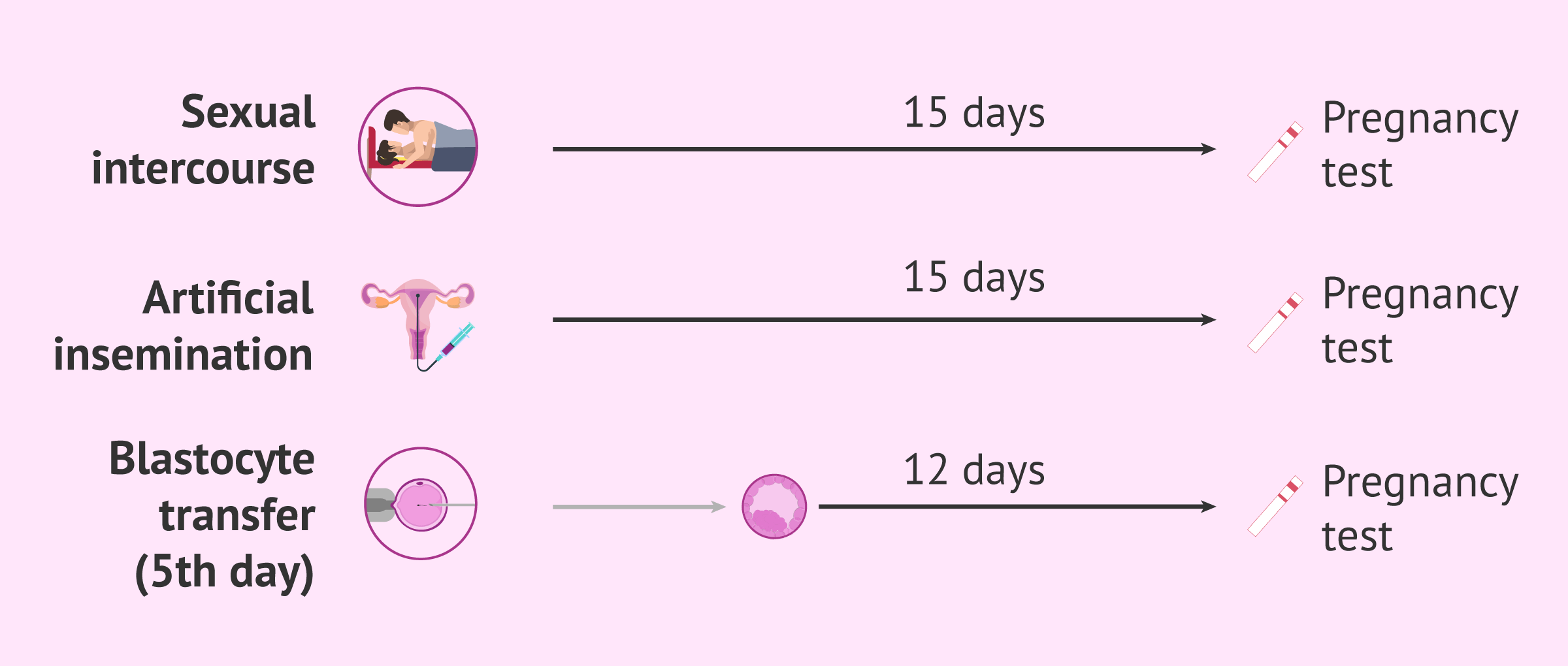Both urine and blood pregnancy tests analyze the presence of hCG hormone to determine whether or not a woman is pregnant. HCG is commonly called the pregnancy hormone, as it´s a hormone released by the embryo.
However, any pregnancy test, whether it´s tested by blood or urine, can give a false negative or false-positive result. Therefore, knowing the possible causes of these erroneous results is of vital importance to know how to detect when they may be occurring and what should be done.
Provided below is an index with the 8 points we are going to expand on in this article.
- 1.
- 2.
- 2.1.
- 2.2.
- 3.
- 3.1.
- 3.2.
- 4.
- 5.
- 5.1.
- 5.2.
- 5.3.
- 6.
- 7.
- 8.
Beta-hCG and pregnancy
As we have already mentioned, hCG is produced by the embryo, so it´s the hormone detected by pregnancy tests to determine whether or not there is a gestation. Both types of pregnancy tests, blood, and urine, specifically detect the beta subunit of the hCG hormone. This explains the reason it´s common to refer to pregnancy tests (especially those performed on blood) as beta-hCG test.
Typically, hCG levels double every 48-72 hours in the first trimester of pregnancy. In general, hCG values double every 48-72 hours and reach a maximum peak around 12 weeks of gestation.
What types of pregnancy tests are there?
The hCG hormone can be detected in both blood and urine for pregnancy testing.
Blood pregnancy test
The main characteristics of blood pregnancy tests are:
- It can generally detect lower levels of hCG hormone than urine tests. In other words, blood pregnancy tests are more sensitive than urine pregnancy tests.
- It allows both qualitative and quantitative measurement of beta-hCG hormone. This means that a blood pregnancy test can not only detect the presence or absence of hCG (qualitative determination), but is able to provide the value at which the hormone is found (quantitative determination).
However, this type of test has the disadvantage of requiring frequent blood draws and analysis by a laboratory. Therefore, the blood pregnancy test cannot be performed at home.
Urine pregnancy test
On the other hand, a urine pregnancy test:
- It´s less sensitive than a blood test, although there are versions of urine pregnancy tests with high sensitivity.
- It only provides a qualitative result.
- It can be taken at home.
Less sensitive pregnancy tests require hCG to be at higher levels in order to detect pregnancy. This feature is of great importance, since, as we will see below, a more sensitive pregnancy test can avoid some false negatives.
False negative pregnancy test
A false negative pregnancy test result (blood or urine) occurs when the test result is negative, but the woman is indeed pregnant.
Causes of false negatives
The main reason for a false negative pregnancy test is that the test has been taken too soon. If the test is done too early, it´s possible that pregnancy is present, but the hCG levels have not yet risen high enough to be detected by the test.
An at-home urine pregnancy test could also give a false negative if it was not performed correctly according to the manufacturer's instructions, if the first urine of the day was not used, or if it was in bad condition or expired. It is essential for the woman to be careful in these aspects so as not to obtain an erroneous result.
However, some medications may also interfere with the result of the pregnancy test.
When a questionable pregnancy test result is obtained, the test should be repeated two or three days later. The hCG values should have increased, as the hCG hormone doubles approximately every 48-72 hours.
When there is a suspected pregnancy with a negative test result, the woman should consult her physician.
How to avoid false negatives
To avoid obtaining a false negative, it´s recommended to perform the pregnancy test at least 15 days after unprotected intercourse. If you don't exactly know when you may have become pregnant, it´s advisable to wait until your period is at least a day late before taking a pregnancy test.
In the case of assisted reproduction treatments, the pregnancy test is performed 12-15 days after insemination or embryo transfer following in vitro fertilization (IVF). The waiting days before taking a pregnancy test, will depend on the type of treatment performed and the day of embryo development (and may vary slightly between clinics). Thus, the wait will be longer in artificial insemination or in the transfer of embryos with fewer days of development, compared to the transfer of blastocysts (embryos at day 5 of development).
Assisted procreation, as any other medical treatment, requires that you rely on the professionalism of the doctors and staff of the clinic you choose. Obviously, each clinic is different. Get now your Fertility Report, which will select several clinics for you out of the pool of clinics that meet our strict quality criteria. Moreover, it will offer you a comparison between the fees and conditions each clinic offers in order for you to make a well informed choice.
It should be noted that the more sensitive the pregnancy test is, whether in blood or urine, the smaller amounts of hormone it will be able to detect. This implies that the number of false negatives will be reduced for this reason. However, you should not take a pregnancy test before your physician´s indicated date.
False positive pregnancy test
A false positive pregnancy test (blood or urine) occurs if the result is positive, but the woman is not pregnant. This situation is quite rare and, if a positive result appears, the woman is most likely pregnant. However, there are certain situations in which the hCG hormone may be shown in pregnancy tests even though there is no gestation or the pregnancy is not developing correctly. The main cases in which this occurs are:
- Ectopic pregnancy
- Anembryonic pregnancy
- Molar pregnancy.
- Some diseases and tumors.
- Medication of assisted reproduction treatments, since in many cases ovulation is triggered by hCG hormone.
- Evaporation lines, if the test result is not read within the recommended time.
Because of this, it is best to make an appointment with a specialist to check that the pregnancy is developing correctly when the result is positive.
FAQs from users
How long do I have to wait to take a pregnancy test after IVF?
In vitro fertilization consists of several phases. The first of these is ovulation induction which goes from menstruation to ovarian puncture (when eggs are removed from the ovary). This phase usually lasts between 10-14 days.
After egg retrieval, the second phase begins which is the "laboratory phase" when the eggs are fertilized and the embryos allowed to evolve. Embryos can be transferred between the second and fifth development days.
When the embryo transfer is performed on the 5th day of the embryonic development (blastocyst stage), the pregnancy test (b-hCG in blood) is scheduled 10-12 after the transfer. This would be the luteal phase which goes from the transfer to the pregnancy test.
Can a pregnancy test give a false positive after AI or IVF?
Yes, assisted reproductive techniques may require the administration of hCG hormone as part of the treatment and this is the hormone that pregnancy tests detect. In this way, the levels of hCG hormone in the patient would be elevated and these could be detected by the pregnancy test. The test would give a positive result, which would be due to the hCG administered and not a pregnancy.
For this reason, it is of crucial importance to take the pregnancy test when indicated by the specialist and to follow their instructions.
Can there be a false positive pregnancy test after an abortion?
Yes. After a miscarriage, hCG levels decrease, but it may take several weeks before they are undetectable. This is why a pregnancy test can give a positive result even though a miscarriage has occurred and the woman is no longer pregnant.
Recommended readings
If you want to learn more about negative tests when you have symptoms of pregnancy, you can visit the following link: Pregnancy Symptoms but Negative Test, What Else Could It Be?
If, however, you are interested in knowing more about ectopic pregnancy, we recommend you read this article: What Causes an Ectopic Pregnancy? - Symptoms, Diagnosis & Treatment.
We make a great effort to provide you with the highest quality information.
🙏 Please share this article if you liked it. 💜💜 You help us continue!
References
Cole LA. The hCG assay or pregnancy test. Clin Chem Lab Med. 2012 Apr;50(4):617-30.
McCash SI, Goldfrank DJ, Pessin MS, Ramanathan LV. Reducing False-Positive Pregnancy Test Results in Patients With Cancer. Obstet Gynecol. 2017 Oct;130(4):825-829.
Montagnana M, Trenti T, Aloe R, Cervellin G, Lippi G. Human chorionic gonadotropin in pregnancy diagnostics. Clin Chim Acta. 2011 Aug 17;412(17-18):1515-20.
Raymond EG, Anger HA, Chong E, Haskell S, Grant M, Boraas C, Tocce K, Banks J, Kaneshiro B, Baldwin MK, Coplon L, Bednarek P, Shochet T, Platais I. "False positive" urine pregnancy test results after successful medication abortion. Contraception. 2021 Feb 14:S0010-7824(21)00033-0.
Theofanakis C, Drakakis P, Besharat A, Loutradis D. Human Chorionic Gonadotropin: The Pregnancy Hormone and More. Int J Mol Sci. 2017 May 14;18(5):1059.
FAQs from users: 'How long do I have to wait to take a pregnancy test after IVF?', 'Can a pregnancy test give a false positive after AI or IVF?' and 'Can there be a false positive pregnancy test after an abortion?'.
Authors and contributors

More information about Cristina Algarra Goosman





